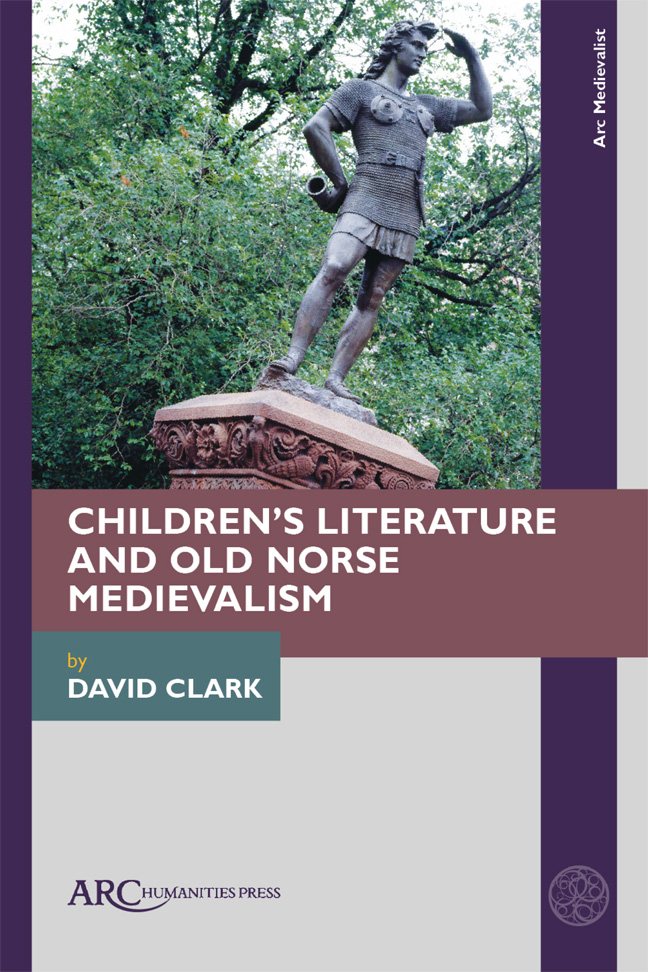Book contents
- Frontmatter
- Contents
- Acknowledgements
- Dedication
- Introduction: The End
- 1 Age-Related Categories
- 2 Generic Categories
- 3 Transformational Fantasy
- 4 Horned Helmets and Comic Anachronism
- 5 Viking Reputation
- 6 Runes and Magic
- 7 The Power of Story
- 8 Race and Ethnicity
- 9 Heroism
- 10 Viking Masculinity
- 11 Viking Femininity
- 12 Viking Sex and Gender
- 13 Bowdlerization
- 14 Sexuality
- 15 Ecological Threat
- 16 Norse Medievalism in Alan Early's Father of Lies Trilogy
- 17 Avoiding the End of Days: K. L. Armstrong and M. A. Marr's Blackwell Pages
- 18 Rick Riordan's Magnus Chase Series and Norse Medievalism
- Conclusion
- Select Bibliography of Frequently Cited Works
- Index
17 - Avoiding the End of Days: K. L. Armstrong and M. A. Marr's Blackwell Pages
Published online by Cambridge University Press: 17 February 2024
- Frontmatter
- Contents
- Acknowledgements
- Dedication
- Introduction: The End
- 1 Age-Related Categories
- 2 Generic Categories
- 3 Transformational Fantasy
- 4 Horned Helmets and Comic Anachronism
- 5 Viking Reputation
- 6 Runes and Magic
- 7 The Power of Story
- 8 Race and Ethnicity
- 9 Heroism
- 10 Viking Masculinity
- 11 Viking Femininity
- 12 Viking Sex and Gender
- 13 Bowdlerization
- 14 Sexuality
- 15 Ecological Threat
- 16 Norse Medievalism in Alan Early's Father of Lies Trilogy
- 17 Avoiding the End of Days: K. L. Armstrong and M. A. Marr's Blackwell Pages
- 18 Rick Riordan's Magnus Chase Series and Norse Medievalism
- Conclusion
- Select Bibliography of Frequently Cited Works
- Index
Summary
KELLEY ARMSTRONG IS a Canadian-born author celebrated for her many fantasy novels set in contemporary North America and embracing a variety of supernatural characters; Arizona-based Melissa Marr is similarly known for a range of contemporary adult and young adult fantasy novels, graphic novels, and short fiction. Together, as K. L. Armstrong and M. A. Marr, they produced the Blackwell Pages trilogy, which follows the Norse-inspired adventures of its main protagonist, fourteen-year-old Matt Thorsen, a descendant of Thor who lives in rural Blackwell, South Dakota, where his father is sheriff. Matt's cousins Fen and Laurie Brekke are “related to the trickster god Loki” (1.5) and have their own powers and divine ancestral heritage. The children's “mission” and the mythological premise of the trilogy is summarized in Odin's Ravens:
to stop Ragnarök, the Norse end of days. In the old stories, the gods all died at Ragnarök. Except they were already dead. Odin, Balder, Loki…All gone. So Matt and the others needed to take their places, presumably without the dying part. If they fail? Then the world would be plunged into endless winter. (2.14–15)
Complicating this task is the fact that Matt's grandfather and the Blackwell elders want him to lose in the conflict with the Midgard Serpent so that “Fimbulwinter would come, and the world would be reborn, fresh and new…After nearly everyone on it died” (2.15). Matt and his friends reject their destined roles in this planned genocide: they want to “change the myth” (2.16).
Throughout the trilogy, therefore, the children must continually negotiate their emergent identities and their Norse heritage, like the protagonists of Arthur Slade's novels, considered earlier. The teenage struggle to achieve individual agency and accommodate familial desires is bound up here with the mythological past and far-reaching questions of fate and freewill. Contemporary ecological concerns are again linked to adult failure and given apocalyptic significance, and all this plays out within an increasingly complex exploration of gender roles and sexuality.
Norse Mythology As Nuisance
Matt's Norse heritage at first represents merely a nuisance for him. Though he believes that Ragnarok will occur, he sees the original gods’ actions as foolhardy: “Because the gods had been…well, stupid, they’d all managed to get themselves killed long ago” (1.43). It is because of the old gods’ failings that he and his friends will have to “stand in” for them in the “final battle.”
- Type
- Chapter
- Information
- Children's Literature and Old Norse Medievalism , pp. 143 - 160Publisher: Amsterdam University PressPrint publication year: 2023

